Mark Carney insists he has no political ambitions in Canada as U.K. committee grills him on term length, pay package
Carney's possible political ambitions arose as an issue in Britain because he insisted on a five-year term when accepting the position, when the normal term is eight years
Mark Carney defends his £874,000 salary:
LONDON — The Bank of England’s next governor, Mark Carney, told British MP’s Thursday that he did not have political ambitions back home in Canada.
“If I had political ambitions, I would have pursued them in Canada,” the currrent head of the Bank of Canada, who leaves his job in June, told the 13 MPs on the Treasury Select Committee.
Carney’s possible political ambitions arose as an issue in Britain because he insisted on a five-year term when accepting the position; the normal term is eight years.
He told the committee that he intends to return to Canada in 2018. The fact that he vacationed last summer at the home of Liberal MP Scott Brison had triggered speculation that he night one day try to become the leader of the Liberal Party of Canada.
Carney declined an invitation from a Labour MP to speak with the committee about any political friendships he may have in Canada.
A five-term was enough time to do what needed to be done “and I can assure you it is my full intention to do what I have set out to do,” he said.
The MPs zeroed in on Carney’s “pay package” during the first part of questioning in a hearing room across from Westminster and the Thames River.
The Harvard and Oxford-educated former Goldman Sachs executive was asked how his pay package looked at a time of austerity given that he is to receive nearly $1.4-million Cdn a year including a housing allowance of more than $400,000 a year.
“The offer of a housing allowance, which I accepted, is consistent with the pay packages of other executives when they come here,” the 47-year-old native of Fort Smith, NWT. said. Carney’s pay and allowances will more than double when compared to what he has received in Ottawa, where he lives in Rockcliffe Park.
“That is a rather large rise given a pay freeze at the bank,” committee chairman Andrew Tyrie said.
Carney, who wore the pinstripe navy blue suit of a banker or senior business executive, calmly defended himself by saying, “I am coming from one of the least expensive capitals to one of the most expensive capitals.”
Peter Foster: Mark Carney, man of destiny, arises to revolutionize society. It won't be pleasant
What Carney ultimately wants is a technocratic dictatorship justified by climate alarmism
In his book Value(s): Building a Better World for All, Mark Carney, former governor both of the Bank of Canada and the Bank of England, claims that western society is morally rotten, and that it has been corrupted by capitalism, which has brought about a “climate emergency” that threatens life on earth. This, he claims, requires rigid controls on personal freedom, industry and corporate funding.
Carney’s views are important because he is UN Special Envoy on Climate Action and Finance. He is also an adviser both to British Prime Minister Boris Johnson on the next big climate conference in Glasgow, and to Canadian Prime Minister Justin Trudeau.
Since the advent of the COVID pandemic, Carney has been front and centre in the promotion of a political agenda known as the “Great Reset,” or the “Green New Deal,” or “Building Back Better.” All are predicated on the claim that COVID, and its disruption of the global economy, provides a once-in-a-lifetime opportunity not just to regulate climate, but to frame a more fair, more diverse, more inclusive, more safe and more woke world.
Carney draws inspiration from, among others, Marx, Engels and Lenin, but the agenda he promotes differs from Marxism in two key respects. First, the private sector is not to be expropriated but made a “partner” in reshaping the economy and society. Second, it does not make a promise to make the lives of ordinary people better, but worse. Carney’s Brave New World will be one of severely constrained choice, less flying, less meat, more inconvenience and more poverty: “Assets will be stranded, used gasoline powered cars will be unsaleable, inefficient properties will be unrentable,” he promises.
The agenda’s objectives are in fact already being enforced, not primarily by legislation but by the application of non-governmental — that is, non-democratic — pressure on the corporate sector via the ever-expanding dictates of ESG (environmental, social and corporate governance) and by “sustainable finance,” which is designed to starve non-compliant companies of funds, thus rendering them, as Carney puts it, “climate roadkill.” What ESG actually represents is corporate ideological compulsion. It is a key instrument of “stakeholder capitalism.”
Carney’s Agenda is promoted by the United Nations and other international bureaucracies and a vast and ever-growing array of non-governmental organizations and fora, especially the World Economic Forum (WEF), where Carney is a trustee. Also, perhaps most surprisingly, by its corporate victims. No one wants to become climate roadkill.
-
 Mark Carney called a 'Davos elite' as Pierre Poilievre goes on offensive
Mark Carney called a 'Davos elite' as Pierre Poilievre goes on offensive -
 John Ivison: New book by Mark Carney reveals him as a man on a mission
John Ivison: New book by Mark Carney reveals him as a man on a mission -
 Carney tells Liberal convention he will 'do whatever I can' to support the party
Carney tells Liberal convention he will 'do whatever I can' to support the party
Carney clearly feels himself to be a man of destiny. “When I worked at the Bank of England,” he writes in Value(s), “I would remind myself each morning of Marcus Aurelius’ phrase ‘arise to do the work of humankind’.” One is reminded of French aristocrat and social reformer Henri de Saint-Simon, the “grand seigneur sans-culotte,” who ordered his valet to wake him with similar words: “Remember, monsieur le comte, that you have great things to do.”
That is not the only thing Carney has in common with Saint-Simon, who believed that society should be ruled by savants such as himself; an alliance of engineers and other technocratic intellectuals, along with bankers. Carney is very much a banker technocrat, not merely at ease gliding along the corridors of global bureaucratic power, but expert at framing arguments that support an ever-expanding role for his class.
His expansive pretensions first appeared at the Bank of Canada. If the economy is like a game of ice hockey, then central bankers should, ideally, be like Zamboni drivers, whose job is to keep the ice flat (Carney had in fact been a goalie during his academic years at both Harvard and Oxford). At the Bank of Canada, he often seemed like the Zamboni driver who thought he was Wayne Gretzky. He could never resist lecturing private businesses to stop sitting on “dead money,” or telling them they were too timid in the international arena, or advising consumers that they were spending too little, or borrowing too much. He promoted “macroprudence,” the idea that regulators, in their panoptic wisdom, would focus on the forest, not the trees. Now, he wants to establish himself as an intellectual.
Carney has a lot to put straight with the world. According to his new book, and the related BBC Reith Lectures that Carney delivered last year, the three great crises of credit (2008–09 version), COVID and climate are all rooted in a single problem: People in general, and markets in particular, are not as wise, moral or far-seeing as Mark Carney. He sums up this failing as the “Tragedy of the Horizon,” a phrase he concocted for a speech ahead of the 2015 Paris climate conference.
However, Carney is sophistic when it comes to the alleged moral shortcomings of capitalism. It has been one of the most tedious tropes of the left since at least The Communist Manifesto that the rise of commerce would drive out all that is virtuous in society, leaving nothing but the “cash nexus” of trade. One of Carney’s favourite philosophers is Harvard’s Michael Sandel, who produces endless trivial examples suggesting that we have moved from a “market economy” to a “market society.”
“Should sex be up for sale?” Carney thunders, following Sandel. “Should there be a market in the right to have children? Why not auction the right to opt out of military service? Why shouldn’t universities sell admission to raise money for worthy causes?” But the very fact that people reflexively feel uneasy about — or outright reject — such notions entirely disproves his point. People do not believe that everything is, or should be, for sale.
Carney notes the long debate, going back to classical times, on the nature of commercial value. This was theoretically resolved by the “marginalist revolution,” which put paid to the “paradox of value” that puzzled over the (usually) low price of useful water and the (usually) high price of useless diamonds. The marginalists pointed out that commercial value isn’t determined by usefulness or labour input. It is inevitably subjective, based on personal preferences and available resources. There is no paradox. Someone dying of thirst in the middle of the desert might be more than willing to offer a bucket of diamonds for a bucket of water.
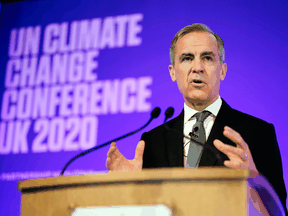
However, market valuations are essentially different from moral values, a distinction Carney continually muddles. He misrepresents the marginalist/subjectivist perspective, claiming that it implies that anything not commercially priced is not considered valuable. “Market value,” he writes, “is taken to represent intrinsic value, and if a good or activity is not in the market, it is not valued.” But who holds such an idiotic view? Nobody “prices” their family, children, friends, community spirit or the beauties of nature, although there is certainly lots of calculation going on in the background. Carney constantly berates “market fundamentalist” straw men who employ “standard economic reasoning” and who believe that people are rational and markets perfect.
He incorrectly claims that Adam Smith — in his first great book, The Theory of Moral Sentiments— said that a sense of morality was “not inherent.” In fact, Smith believed that we are born with such a sense, which is then fine-tuned by the society in which we grow up. However, Carney — like all leftists — leans towards the blank slate, nurture-over-nature perspective because it suggests that human nature might be beneficially reformed under the right (that is, left) social arrangements.
Carney believes our moral sentiments started going astray around the time of the publication of Smith’s better-known book, The Wealth of Nations, in 1776, when the Industrial Revolution was beginning to take off. He rightly suggests that one should read both books to gain a full appreciation of Smith’s insights, but he seems to have missed the significance of Smith’s putdown of “whining and melancholy moralists,” his cynicism about “insidious and crafty” politicians, and his thoroughgoing skepticism about those who would “trade for the public good” (that is, the ESG crowd). Moreover, Smith noted that the greatest corrupter of moral sentiments was not commerce but “faction and fanaticism,” that is, politics and religion, which come together in the toxic stew of climate alarmism and ESG.
ESG used to be called Corporate Social Responsibility, or CSR. The Nobel economist Milton Friedman warned against its subversive nature 50 years ago. He noted that taking on externally dictated “social responsibilities” beyond those directly related to a company’s business opened the floodgates to endless pressure and interference. The big questions are responsibility to whom? And for what?
Carney also typically misrepresents Friedman, suggesting that he claimed that shareholders should rank “uber alles,” and to the exclusion of other legitimate stakeholders such as employees and local communities. Carney claims that “At times, large positive gains could accrue to society if small sacrifices were made on behalf of shareholders.” But by what right would management “sacrifice” shareholders, and who would decide which sacrifices should be made?
Carney admits that the “integrated reporting” required by ESG is a morass: “ESG ratings consider hundreds of metrics, with many of them qualitative in nature… Putting values to work is hard work, but as with virtue, it should become easier with sustained practice.” No need to ask whose version of values and virtue is to prevail.
Despite his thorough castigation of market society, Carney somehow also believes this “corroded” society is clamouring to make great personal sacrifices for draconian climate actions and the UN’s Sustainable Development Goals.
Carney has been a prime pusher of “net-zero,” the notion that climate-related human emissions must be entirely eradicated, buried or offset by 2050 if the world is to avoid climate Armageddon. He claims that net-zero is “highly valued by society.” In reality, the vast mass of people have no clue what it entails; when Carney talks about this version of “society,” he is talking about a small, radical element of it.
Carney peddles the non-sequitur that because the world wasn’t ready for COVID, this confirms that the world is being short-sighted about climate catastrophe. But COVID is an obvious reality; an existential climate catastrophe is a hypothesis (frequently promoted — admittedly with great success — by those with agendas). He claims that “A good introduction to this subject can be found in journalist David Wallace-Wells’ The Uninhabitable Earth,” a work heavily criticized even by prominent climate-change scientists for its factual errors and exaggerations. Indeed, even its author admitted its tendentious purpose.
Carney also commends the knowledge and wisdom of Swedish teenager Greta Thunberg: “The power of Greta Thunberg’s message lies in the way she drives home both the cold logic of climate physics and the fundamental unfairness of the climate crisis.”
Anybody who cites an anxious 17-year-old as an authority on climate science and moral philosophy should be an object of deep suspicion, but then, according to Carney, climate science is easy. Greta’s “basic calculations” are ones that she could “easily master and powerfully project.” (Carney says he once gave Greta a tour of the Bank of England’s gold vaults. One wonders if she also offered up tips on monetary policy.) But then, in early 2020, Greta demonstrated her complete disconnect from reality when, at the WEF in Davos, she called for an immediate cessation of emissions, which would tank the world economy and potentially kill millions. Even Carney admits deviating from her wisdom on that point.
Far from demonstrating a firm knowledge of the climate system himself, Carney cites scary but misleading statistics. “Since the 1980s,” he writes, “the number of registered weather-related loss events has tripled, and the inflation-adjusted losses have increased fivefold. Consistent with the accelerated pace of climate change, the cost of weather-related insurance losses has increased eightfold in real terms over the past decade to an annual average of $60 billion.”
I asked Professor Roger Pielke, Jr., an expert on climate and economics at the University of Colorado, to comment. He replied “(Carney) has confused economics with weather. The increase in losses he describes is well understood to occur for two main reasons: more wealth and property exposed to loss and better accounting of those losses. To assess trends in extreme weather one should look at weather data, not economic loss data.”
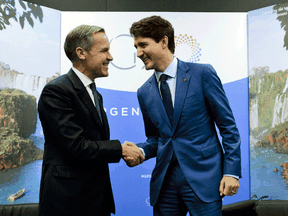
Carney’s confusion is hardly innocent since his Agenda depends on incessantly claiming that “What had been biblical is becoming commonplace.”
Fortunately, Carney has been making claims about worsening weather for long enough that we can assess some of his predictions. In his recent book Unsettled: What Climate Science Tells Us, What It Doesn’t, and Why It Matters, Steven Koonin, former undersecretary for science at the Obama-era U.S. Energy Department, cites the speech Carney made to Lloyd’s of London before the Paris climate conference in 2015. The speech was designed to frighten the insurance industry into divestment from fossil fuels, on the basis that many oil and gas reserves would be “stranded” as we exhaust our allowable carbon “budget.” Carney pointed out that the previous U.K. winter had been the “wettest since the time of King George III.” He went on to say, “forecasts suggest we can expect at least a further 10% increase in rainfall during future winters.” For support he cited the U.K. Met Office’s forecast for the next five years. It turned out to be dead wrong. The six winters after 2014 averaged 39-per-cent less rainfall than the 2014 record. Meanwhile a Met Office report in 2018 acknowledged that the “largest source of variability in U.K. extreme rainfalls during the winter months was the North Atlantic Oscillation mode of natural variability, not a changing climate.”
“(I)t’s surprising,” notes Koonin, “that someone with a PhD in economics and experience with the unpredictability of financial markets and economies as a whole doesn’t show a greater respect for the perils of prediction — and more caution in depending upon models.”
During his BBC Reith Lectures last year, on the topic of “How We Get What We Value,” Carney received few challenges from his handpicked questioners, but a couple came from eminent historian Niall Ferguson. Ferguson asked Carney why, in his discussion of the climate issue, he made no reference to Bjorn Lomborg (a much more knowledgeable Scandinavian than Greta), and in particular to Lomborg’s book, False Alarm, in which Lomborg establishes — using “official” science — that there is no existential climate crisis, that adapting to climate change is manageable, and that the kinds of policies promoted by Carney are likely to be far more costly than any impact from extreme weather.
Carney of course hadn’t read that book, but he dismissed Lomborg by saying that “it’s 15 or 20 years ago when he first came out with his ‘Don’t worry about the climate.’ How’s that working out for us?” But Lomborg never said “Don’t worry about the climate,” he just suggested that we had to put risks into perspective. Meanwhile Lomborg’s non-alarmist thesis is working out much better than that of doomsayers such as Carney.
This offhand rejection of someone as widely respected as Lomborg exposes the hypocrisy of Carney’s statement in Value(s) that “experts need to listen to all sides…All of us as individuals have a responsibility to be more open and to engage respectfully with different views if we want constructive political debates and to make progress on important issues.” Except, climate-catastrophe dissenters don’t make it into the debate. There can be zero diversity of views on net-zero.
Ferguson put another thorny question to Carney at that Reith lecture: He pointed out that since the 2015 Paris agreement, China had been responsible for almost half the increase in global carbon emissions, and it was building more coal capacity in the current year than existed in the entire United States. What did China’s promises of net-zero by 2060 mean, Ferguson asked, if it was “actually leading the pollution charge”? Carney’s non response was that China is the largest manufacturer of zero-emission cars, and the leading producer of renewable energy.
Koonin notes in his book that Carney “is probably the single most influential figure in driving investors and financial institutions around the world to focus on changes in climate and human influences upon it…. So it’s important to pay close attention to what he says.”
Mark Carney cries crocodile tears at the possible viability of the Marxist perspective in today’s political environment. But if there is one sure sign of a Marxist, it’s a belief that capitalism is — or is about to be – in “crisis.” His new book has an appendix on Marx’s theory of surplus value: that all profits are wrung from the hides of labour. He also cites Marx’s collaborator, Friedrich Engels. In particular he notes “Engels’ pause,” the one period in capitalist history, early in the 19th century, when workers may not have shared the increases in productivity brought about by industrialization.
Carney projects that the “Fourth Industrial Revolution” (a phenomenon much invoked by the WEF) might bring about a similar period, thus providing a source of political unrest. “(I)t could be generations before the gains of the Fourth Industrial Revolution are widely shared,” he writes. “In the interim, there could be a long period of technological unemployment, sharply rising inequalities and intensifying social unrest… If this world of surplus labour comes to pass, Marx and Engels could again become relevant.”
He rather seems to hope so.
Carney claims powerful parallels between Marx’s time and our own. “Substitute platforms for textile mills, machine learning for the steam engine, and Twitter for the telegraph, and current dynamics echo those of that era. Then, Karl Marx was scribbling the Communist Manifesto in the reading room of the British Library. Today, radical viral blogs and tweets voice similar outrage.”
In fact, Marx wrote The Communist Manifesto, based on a tract by Engels, in Brussels, not at the British Library, but it’s more important to remember where Marx’s misguided and immutable outrage led: to a disastrous economic and political model that generated poverty and mass murder on an unprecedented scale. Meanwhile “outrage” is surely a dubious basis for policy. The outraged are certainly a useful constituency for those seeking power, however, which brings us to the influence on Carney of the man who first tried to put Marxism into practice.
When it comes to the COVID crisis, writes Carney, “We are living Lenin’s observation that there are ‘decades when nothing happens and weeks when decades happen’.” Strange that Carney would cite one of the most ruthless murderers in history for this rather bland insight, but then Carney’s Agenda is not without its own parallels to Lenin (minus, one presumes, the precondition of rampant bloodshed).
Although Vladimir Lenin didn’t know much about business or economics, he declared that “’Communism is Soviet power plus the electrification of the whole country.” Carney’s plan is global. “We need,” he claims, “to electrify everything and turn electricity generation green.” The problem is that wind- and solar-powered electricity needs both hefty government subsidies and fossil-fuel backup for when the wind doesn’t blow and the sun doesn’t shine. Green electricity is inflexible, expensive and disruptive to grids.
Carney cites Joseph Schumpeter’s concept of “creative destruction,” but his own version involves not the metaphorical and benign process of market innovation making old technologies redundant, but a deliberate suppression of viable technologies to make way for less reliable and less economic alternatives.
When Lenin wrecked the Russian economy after brutally seizing power in 1917, he was forced to backtrack and allow some private enterprise to prevent people starving. However, he assured his radical comrades that he would retain control of “the commanding heights” of heavy industry. Carney’s plan is to control the global economy by seizing the commanding heights of finance, not by nationalization but by exerting non-democratic pressure to divest from, and stop funding, fossil fuels. The private sector is to become a partner in imposing its own bondage. This will be do-it-yourself totalitarianism. Indeed, companies in our one-party ESG state are already pleading like show-trial defendants, making suicidal net-zero commitments, lest banks cut them off.

To further that end, Carney has helped to start a key organization, the Network for Greening the Financial System (NGFS), a collection of central banks and regulators. He has also signed up an ever-growing constituency of activist policy wonks who peddle emissions measurement and certification, eco audits and ESG rankings. This agenda is inevitably appealing to transnational organizations such as the International Energy Agency (IEA), the IMF, the World Bank and the OECD, whose empires are all lucratively intertwined with the global governance thrust. In May, the IEA issued a report calling for an immediate end to fossil fuel investment to get to net-zero.
Part of Carney’s strategy is to force “voluntary” standards on banking and industry, then have governments make those standards compulsory. The major accounting firms appear keen to promote the possibility of endless auditing extensions, under which the relatively straightforward metric of money is to be replaced by the infinitely malleable concepts of “purpose” and “impact.”
Carney has also helped turn the accounting screw though “carbon disclosure.” Companies are pressured to make explicit the kind of damage they might suffer if the alarmists’ worst nightmares are realized. Such disclosure is a variant on that famous loaded question “When did you stop beating your spouse?” Instead, carbon disclosure asks the climate equivalent of “If you were to beat your spouse, what sort of injuries might he/she suffer?” Companies must also disclose their plans to deal with the presumed crisis. No company dares to say “We do not believe your apocalyptic forecasts.” They meekly regurgitate the required climate porn about floods and droughts and hurricanes, and make elaborate fingers-crossed emissions-reductions commitments. This in turn leads them into arrangements such as buying emissions offsets, a complex scheme analogous to the medieval Catholic Church’s sale of indulgences. Carbon markets have inevitably led to a surge in work for offset generators, certifiers and auditors. Carney projects this market could be worth $100 billion.
Ironically, earlier this year Carney found himself tangled in the murky metrics of offsets. In 2020, he was appointed a vice chairman with Toronto-based Brookfield Asset Management, where he is in charge of “impact investing.” As historian Tammy Nemeth points out in her critical study of the “Transnational Progressive Movement,” of which Carney is a leading light: “(I)t is perhaps ethically murky for someone who is actively working within the UN and advising two different governments on how to change national and global financial rules to be working for a company that will be a direct beneficiary of those rule changes.” Still, who better to lead your company through a minefield than the person who planted the mines?
Except that Carney was hoist with his own petard when he claimed that Brookfield, which has major investments in fossil fuels and pipelines, was already “net-zero” due to emissions “avoided” as a result of its investing in renewable energy. Carney’s claim produced instant refutation and accusations of greenwashing. The Financial Times called it a “major stumble.” A representative of CDP (formerly the Carbon Disclosure Project) castigated those who attempt to hide “dirty coal issues.” Carney subsequently issued a qualified mea culpa on Twitter: “I have always been — and will continue to be — a strong advocate for net zero science-based targets, and I also recognize that avoided emissions do not count towards them.”
H. L. Mencken observed that “The urge to save humanity is almost always a false-front for the urge to rule.” So, just how big a threat is the agenda of Mark Carney and his fellow “transnational progressives”?
In his book, Value(s), Carney lays out rationalizations and autocratic pretensions, although he is less forthcoming about his motivations. He writes that “Leaders need to renounce power for its own sake and discern the power of service.” Mencken would be amused.
The shambolic response to COVID of many governments, not least in Canada, and the distinctly unsettled nature of pandemic “science,” have not done much for the credibility of either governments or experts. The Carney-backed agenda is not predicated on working through democratic institutions but on circumventing them. Still, he is also reported to have more conventional political aspirations, namely to join the federal Liberal party and rise within it, very possibly to prime minister. (Carney recently gave a speech at the Liberal national convention, where he pledged his full support.)
He thus has a rather ill-fitting section in Value(s) on “How Canada Can Build Value for All.” It reads like a Liberal party stump speech. According to Carney “We (in Canada) routinely transcend the limitations of our size to model values and policies for other countries.” It’s the old chestnut that no progressive Canadian leader ever seems to tire of: The world needs more Canada.
Carney is a classic example of what Friedrich Hayek called the “fatal conceit” of constructivist rationalism: the belief that the largely spontaneous institutions of the market order should be rejected in favour of more deliberately planned arrangements. Carney is undoubtedly an intelligent man, but Hayek stressed that the thing that intelligent people tend most to overestimate is the power of intelligence — particularly if they happen to be socialists.
Carney is also of the class that philosopher Karl Popper described as “enemies” of an “open society.” Popper noted that social upheavals tend to bring forth prophets who claim to understand the forces shaping the future, and promise salvation if they are given absolute power. Such was Plato’s model — in response to the upheavals of the Peloponnesian War and the first wave of democracy — of a necessary dictatorship in which the rulers lived as communists, using a specially bred military to control a cattle-like populace. Similarly, Marx’s communism was a response to the turmoil of the Industrial Revolution.
Considering the squalor of Manchester in the 1840s, one might forgive Marx and Engels for thinking a radical response was in order. But given the success of capitalism and the horrors of autocratic systems in the intervening period, it takes considerable chutzpah to be promoting net-zero totalitarianism.
Still, Carney claims that great crises demand great plans. He cites Timothy Geithner, secretary of the U.S. Treasury under president Obama, saying “plan beats no plan.” But Geithner was talking about the very real and immediate 2008–09 financial crisis. Carney’s climate plan is much closer to the notion of Soviet central long-term planning. Clearly, when it came to the subsequent welfare of the Russian people, “no plan” would certainly have beaten “plan.”
What Carney ultimately wants, like Saint-Simon, is a technocratic dictatorship justified by climate alarmism. He suggests that “governments can delegate certain aspects of the calibration of specific instruments… to Carbon Councils in order to improve the predictability, credibility and impact of climate policies.” These carbon councils will be able to demand that national governments “comply or explain” when they inevitably fall short of targets. How these commissars will bring governments into line is unclear, although Nobel economist William Nordhaus has suggested “Climate Clubs” that will punish recalcitrants with punitive tariffs.
The threat of punishment will clearly be necessary because governments are doing little more than hypocritical tinkering on climate policy. China and India are hardly even playing lip service to the “climate emergency.” Nevertheless, according to Carney “political technology” is needed to “build a broad consensus around the right goals.” No question of debating the goals, or the science, just building a consensus to support them.
Carney is a man on a mission to change global society. “Business as usual” — the most hated phrase in the socialist lexicon — is “ultimately catastrophic,” he writes. There is too much “misplaced acceptance of the status quo.” But somehow the new socialism will not be socialism as usual. This time it’s different. We can because we must. The threat is too great to permit any argument. It’s surprising that as he was picking out choice quotes from Lenin for his book, Carney missed this one: “No more opposition now, comrades! The time has come to put an end to opposition, to put the lid on it. We have had enough opposition!”
Peter Foster is the author of 10 books. His most recent is How Dare You!, a collection of his National Post columns. His previous book was Why We Bite the Invisible Hand: The Psychology of Anti-Capitalism.
John Ivison: Mark Carney isn’t ruling himself in as a potential Liberal leader, either
After his home-heating-oil fiasco, it is hard to see a way back for Justin Trudeau, and so the chances of a leadership contest are on the rise
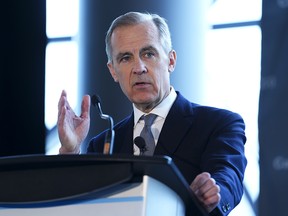
The “news” that Mark Carney has refused to rule himself out of any Liberal leadership contest is less compelling than it first appears. A closer read of the recent Globe and Mail interview that revealed the news reveals he also refused to rule himself in.
Carney has been straddling the fence on whether to commit to politics so long, he must be at risk of iron poisoning. Trudeau even offered Carney the job of finance minister to succeed Bill Morneau after Carney’s tenure ended at the Bank of England, but the timing did not work out.
What is clear is that the former bank governor remains drawn to public service and, should Justin Trudeau call it a day, Carney would be a leading candidate.
A keen student of political history, he knows that he who wields the knife shall never wear the crown, so there is no prospect of him orchestrating Trudeau’s departure.
I think it remains a fifty-fifty proposition whether that even happens. Trudeau has never lost an election; he single-handedly resurrected the Liberal party; and he can point to a track-record of winning after being written off.
However, the recent decision to undermine the integrity of his own carbon-pricing system by exempting home heating oil, in order to appease voters in Atlantic Canada, appears to be the final straw for many Liberals like Jean Chrétien’s former chief of staff, Senator Percy Downe, who is calling for Trudeau to step down.
The decision to leave may end up not being Trudeau’s to make.
-
 Majority of Canadians think Trudeau should step down before next election: poll
Majority of Canadians think Trudeau should step down before next election: poll -
 John Ivison: Don't expect Mark Carney to be the next Liberal Messiah (2019)
John Ivison: Don't expect Mark Carney to be the next Liberal Messiah (2019)
The home-heating-oil fiasco was so badly executed that even someone as cautious as Carney questioned it publicly, saying he would have looked for other ways to support people struggling with soaring home heating bills.
It is hard to see a way back for the prime minister, and so the chances of a leadership contest are on the rise.
The Conservatives are delighted at the prospect of taking a crack at Carney, who leader Pierre Poilievre has called the “incoming leader of the Liberal party.”
Images of former Liberal leader Michael Ignatieff and ex-Quebec premier Jean Charest have been cast up as evidence that some people are simply not cut out for modern politics. Ignatieff was leader when Stephen Harper won his majority in 2011, sending him back to Harvard to think again. Charest’s Conservative leadership campaign was crushed by Poilievre last year, imparting a warning to “elites” that citizens have lost trust in leaders who they blame for handing control to central banks and the World Economic Forum.
Civility, experience and expertise are seen almost as liabilities in such contests; successful candidates have to persuade the angry and disenfranchised that they are “fighting for you,” as Poilievre claims to have done since being elected as a 25-year-old in 2004. Reputations count for nothing in such a world — and facts scarcely more.
Poilievre is promising to lower inflation by scrapping the carbon tax to reduce the cost of gas, groceries and housing.
Yet the carbon tax is responsible for just one-twentieth of price increases, according to the current governor of the Bank of Canada, Tiff Macklem; less than 0.2 per cent of inflation.
But who would believe Macklem, after all Poilievre’s efforts to rubbish his reputation? (The Conservative leader has repeatedly pledged he will fire the bank governor if he becomes prime minister.)
It is the same kind of naked hostility that is likely to greet Carney if he ever does step into the ring.
So how well equipped is he to fight back? Is he another Ignatieff?
The answer to that is, there are similarities in their comparative lack of experience in retail politics, but their backgrounds are starkly different. Ignatieff is the son of a diplomat who went to Upper Canada College before finding success overseas as a journalist and academic; Carney is the son of a teacher who went to public school in Edmonton and then gave up a career with Goldman Sachs to work for the Canadian government in the Department of Finance.
William Hazlitt, the famous English 18th century critic, once said that successful politicians need to subject the will of others to their own; they need to foresee a long and complicated train of events and “unwind the web of others’ policies and weave your own out of it”; they must understand character thoroughly, to see “latent talent and lurking treachery”; and they have to have a purpose steadily in view, removing every obstacle to it.
Carney (whom I consider a friend) is not a born politician, someone who wants nothing but power. But he does have a vision of what he wants to do in public life, which he expressed quite clearly at the Canada 2020 Global Progress Action Summit in September. At the time, he said it’s time to build health care, infrastructure, schools, “opportunity, sustainability and prosperity,” utilizing the private sector rather than spending public funds. He contrasted that with Conservative politicians’ interest in destroying, rather than building. “When politicians proclaim that our great democracies are broken, it’s not because they want to fix them. It’s because they want a licence to demolish them.”
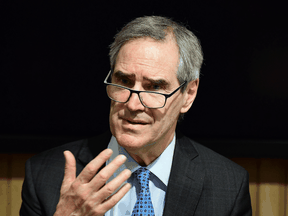
Carney has a game plan in mind, based more on equality of opportunity than equality of outcomes.
However, Ignatieff’s ordeal makes clear there is more to politics than strategy, something he reflected upon after his return to academia in his book Fire and Ashes.
He said that people may suspect the difference you want to make is to your own life, not theirs. “If a politician cannot succeed in convincing voters that he is in it for them, he cannot win standing and without it, no message can get a hearing.”
Carney will have to come up with something more convincing than noblesse oblige, the inferred responsibility of privileged people to look after their inferiors, if he is to convince voters he has come back for them.
Ignatieff said he took a while to grasp that explanations always come too late — that you can never explain or never complain.
He said he learned that political knowledge is learning an issue in your guts, not your head, and knowing which causes to back to the hilt.
Ignatieff said that once you enter politics, you are always on show, and you have to surrender the entirety of your private life for the duration. “People are watching.”
He said that great politicians have to be masters of the local — wherever they are. “They have to give the impression of being at home.”
He learned that politics is intensely physical — “your hands touch, clasp and hold and your eyes are always reaching for contact.”
Great politicians can make contrivance look uncontrived, he said. “All the human skills in politics involve artifice but the artifice must be concealed with ease and grace.”
Ignatieff said none of this came naturally to him, and I doubt it would to Carney either.
Carney’s experience as a bank governor is better preparation than academia or journalism. In that role, Carney was certainly used to obfuscation when asked difficult questions on matters like interest rates.
He has plenty of experience charming rooms full of friendly business types, eyes twinkling and witticisms flowing.
But even his experience during the Brexit referendum, where he emerged as a hate figure for the Brexiteers, is unlikely to have prepared him for the leadership of a political party. As Ignatieff pointed out, another burden of politics is the “lunatic literal-mindedness” of its language. In his Globe interview, Carney ad-libbed: “Better is always possible” — one of Trudeau’s slogans — when asked if a Liberal victory is achievable. But as Ignatieff warned, on entering politics you have to surrender spontaneity and glibness.
Ultimately, Ignatieff realized that it just wasn’t him.
“I had never been so well-dressed in my entire life and never felt so hollow. I would say that some sense of the hollowness; some sense of a divide between the face you present to the world and the face you reserve for the mirror is a sign of sound mental health,” he said.
Ignatieff was not a born politician and he did not learn to become one. Carney is more at ease politically — he has some of what Ignatieff referred to as a “physical grace, perfected through years of training and stored like muscle memory in the tissue.”
Carney has name recognition across the country and he has the fiscal credentials to persuade many Canadians that he would restore some discipline to the nation’s finances.
But is it him? Who knows? Probably not even the man himself.
Twitter.com/IvisonJ
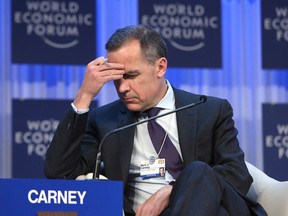
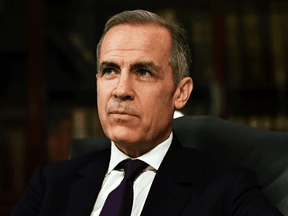
No comments:
Post a Comment